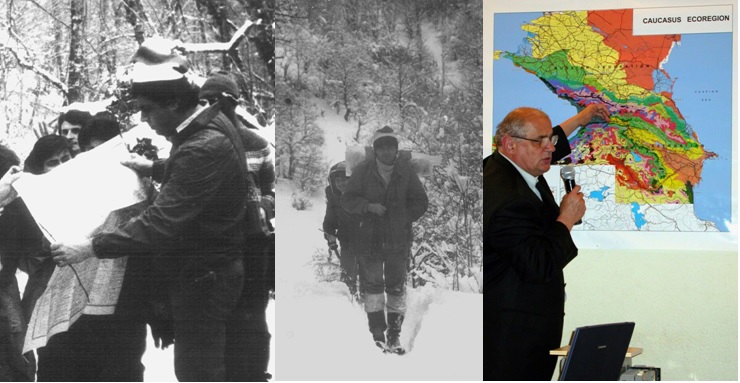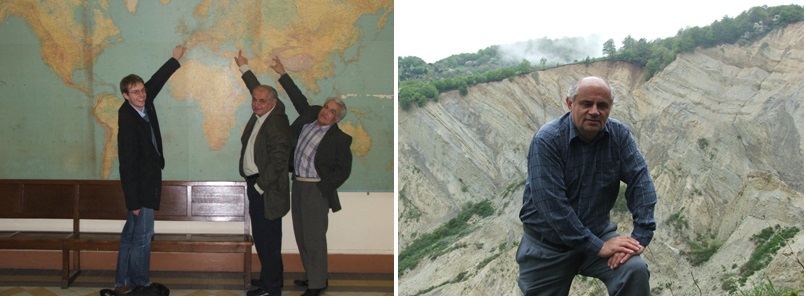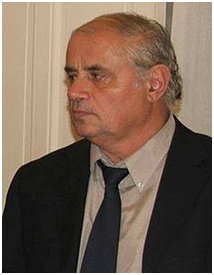BIOGRAPHY

Born: 21 August, 1947, in Tbilisi. After finishing school N.Beruchashvili entered the Tbilisi State University at the Geography-Geology faculty in 1965, wich he graduated from in 1970. Graduation paper was acknowledged satisfactorily for candidate's of sciences academic degree and so he maintained a thesis for a candidate's degree in the Moscow State University in 1971. At the same University in 1981 N.Beruchashvili maintained thesis for a doctor's degree for doctor's title of geography sciences of academic degree.
From 1970 N.Beruchashvili has been worked at the Tbilisi State University as the assistent, and from 1974 as docent. From 1982 N.Beruchashvili is the holder of the chair of Cartography (from 1991 chair of Cartography and geoinformation), at the same University. From 1983 -professor.
During 1975-76 N.Beruchashvili did a special course at the Paris VII University in France. Since that, N.Beruchashvili visited France several times. In 1987, 1990, 1992-1993, 1994,1995,1996, 1998, 2001,2002, 2003, 2005, he was invited at the Paris VII University to give lectures and did scientific works. Besides he gave lectures at the Universities of other European countries (Warsaw, Sofia, University in Brno, Toulouse, Grenoble and others).
N.Beruchashvili published 248 scientific works, of them the 28 monographies (from them 3 in Paris, 3 in Moscow).
Under his leadership 25 post-graduate students had maintained theses. The scientific adviser of 2 theses for a doctor's degree.
As the geographer has visited and worked in 60 various countries of the World.
N.Beruchashvili has a wife and three sons.

Niko Beruchashvili - Tireless Traveler in Space and Time (1947-2006). http://www.homeofgeography.org/uk/e_Newsletters/04_Apr06.pdf
 Professor Niko Beruchashvili, Doctor of Sciences (Geography), Chair of the Department of Cartography and Geoinformatics, Tbilisi State University, and Chair of the International Geographical Union's Commission on Landscape Analysis, passed away on March 24, 2006, at the age of 58 in Tbilisi, Georgia. In the years 1971-1976, Dr. Beruchashvili organized and led a program of year-round observations on the dynamics of landscape at the Martkopi Station. Stationary studies of such intensity - unknown before to the international research community have enabled scientists to quantify diurnal states of landscape that Dr. Beruchashvili called stexes. On the basis of the station's research data, Dr. Beruchashvili has developed the concept of landscape geophysics whose principal notions are geomasses and geohorizons.In parallel with research at the Martkopi Station, Dr. Beruchashvili led annual expeditions, both in summer and winter seasons, in the Caucasus and other mountainous regions of the Soviet Union. These expeditions became an inimitable school for hundreds of geographers, many of whom are now shaping the 'face' of this science in the post Soviet domain.By late 1970s, Dr. Beruchashvili has for mulated the main concepts of spatio -temporal analysis and synthesis of landscape, which became the basis for his post-doctoral dissertation defended in 1981 at Moscow State University and for his landmark monograph, Four Dimensions of a Landscape (Moscow, 1986). His methodological concept of landscape synthesis followed a logical sequence: geomass ? geohorizon ? vertical structure ? stex ? natural-territorial complex.In 1980s, Niko Beruchashvili developed a new direction in landscape science - the ethology of landscapes - which studies the "behavior" as a trajectory of changes of their temporal states. In late 1980s, on the basis of the unique databank of the Caucasus landscapes, Professor Beruchashvili organized the development of Georgia's first Geographic Information System (GIS).In the years following the breakup of the Soviet Union, Professor Beruchashvili did his best to maintain active professional contacts with his colleagues in the ex-Soviet states and worked hard to promote the achievements of Georgian geography within the international geographic research community. He actively lectured at the University of Paris and published there in 1991 his monograph, Géosystèmes et Paysages: Bilan et Méthodes (jointly with G. Rougerie), which summarized "western" and "eastern" approaches in landscape science. His innovative book Caucasus: Landscapes, Models, Experiments (Tbilisi, 1995) can be considered equally as anexhaustive reference on the landscapes of the Caucasus and a software manual for the Caucasus landscapes GIS and modeling package. Since late 1990s, as the Chair of the National Committee of Georgian Geographers, Professor Berushashvili was actively engaged in the activities of the International Geographical Union (IGU). In 2004 the IGU General Assembly approved him as the chairman of the newly established Commission on Landscape Analysis. He successfully launched the Commission's activities by organizing its first international conference "Critical Areas in a Landscape: From Theory to Mapping and Management" in Tbilisi, May 2005, and actively planned continuation of these initiatives at the IGU Regional Conference in Brisbane in July 2006. Another major contribution to IGU was educational. Together with colleagues from Mexico and South Africa, he was part of a pilot project on educational materials for secondary school teachers on issues of geography and sustainable development. This resulted in a Teacher's Guide, published in Moscow by the project leader, IGU Vice-President, the late Nikita Glazovski. The success of this pilot effort led to a more comprehensive, ICSU-funded, project to produce teaching and learning materials for capacity building in developing nations, which involved teachers and researchers from 9 different countries and which Niko was one of the founding members of. In the recent years, Professor Beruchashvili coordinated development and implementation of practical applications of landscape analysis, including such areas as conservation of biological and landscape diversity and sustainable forest management in Georgia, under several projects supported by the Global Environment Facility, World Bank and World Wide Fund for Nature. He and his colleagues developed and successfully tested new techniques of mountain forest inventory on a landscape-ecological basis, with the production of landscape sustainability maps (so-called semaphore maps) for forest management planning. Professor Beruchashvili authored over 200 research titles in national and international publications, including dozens of monographs, university and secondary-school textbooks. In 2001 he launched The Caucasus Geographical Journal. Niko Beruchashvili was a real "romantic geographer". He could not imagine geography without travel. His exuberant energy, inhuman productivity, vast erudition, openness attracted to him fellow geographers of all countries. His former students now work in universities, research facilities, and international organizations around the world. He succeeded in attracting the attention of geographers to the "fourth dimension" of a landscape - time - particularly in the diurnal states of landscapes. The Caucasus, with its outstanding spatial-temporal contrasts, turned out to be best suited to support this scientific challenge. It would be no exaggeration to say that the main part of Niko Beruchashvili's works is a geographic poem about the Caucasus, written in the language of landscape dynamic states. Professor Niko Beruchashvili, an outstanding geographer and tireless traveler, will be forever remembered by the community of geographers.
Professor Niko Beruchashvili, Doctor of Sciences (Geography), Chair of the Department of Cartography and Geoinformatics, Tbilisi State University, and Chair of the International Geographical Union's Commission on Landscape Analysis, passed away on March 24, 2006, at the age of 58 in Tbilisi, Georgia. In the years 1971-1976, Dr. Beruchashvili organized and led a program of year-round observations on the dynamics of landscape at the Martkopi Station. Stationary studies of such intensity - unknown before to the international research community have enabled scientists to quantify diurnal states of landscape that Dr. Beruchashvili called stexes. On the basis of the station's research data, Dr. Beruchashvili has developed the concept of landscape geophysics whose principal notions are geomasses and geohorizons.In parallel with research at the Martkopi Station, Dr. Beruchashvili led annual expeditions, both in summer and winter seasons, in the Caucasus and other mountainous regions of the Soviet Union. These expeditions became an inimitable school for hundreds of geographers, many of whom are now shaping the 'face' of this science in the post Soviet domain.By late 1970s, Dr. Beruchashvili has for mulated the main concepts of spatio -temporal analysis and synthesis of landscape, which became the basis for his post-doctoral dissertation defended in 1981 at Moscow State University and for his landmark monograph, Four Dimensions of a Landscape (Moscow, 1986). His methodological concept of landscape synthesis followed a logical sequence: geomass ? geohorizon ? vertical structure ? stex ? natural-territorial complex.In 1980s, Niko Beruchashvili developed a new direction in landscape science - the ethology of landscapes - which studies the "behavior" as a trajectory of changes of their temporal states. In late 1980s, on the basis of the unique databank of the Caucasus landscapes, Professor Beruchashvili organized the development of Georgia's first Geographic Information System (GIS).In the years following the breakup of the Soviet Union, Professor Beruchashvili did his best to maintain active professional contacts with his colleagues in the ex-Soviet states and worked hard to promote the achievements of Georgian geography within the international geographic research community. He actively lectured at the University of Paris and published there in 1991 his monograph, Géosystèmes et Paysages: Bilan et Méthodes (jointly with G. Rougerie), which summarized "western" and "eastern" approaches in landscape science. His innovative book Caucasus: Landscapes, Models, Experiments (Tbilisi, 1995) can be considered equally as anexhaustive reference on the landscapes of the Caucasus and a software manual for the Caucasus landscapes GIS and modeling package. Since late 1990s, as the Chair of the National Committee of Georgian Geographers, Professor Berushashvili was actively engaged in the activities of the International Geographical Union (IGU). In 2004 the IGU General Assembly approved him as the chairman of the newly established Commission on Landscape Analysis. He successfully launched the Commission's activities by organizing its first international conference "Critical Areas in a Landscape: From Theory to Mapping and Management" in Tbilisi, May 2005, and actively planned continuation of these initiatives at the IGU Regional Conference in Brisbane in July 2006. Another major contribution to IGU was educational. Together with colleagues from Mexico and South Africa, he was part of a pilot project on educational materials for secondary school teachers on issues of geography and sustainable development. This resulted in a Teacher's Guide, published in Moscow by the project leader, IGU Vice-President, the late Nikita Glazovski. The success of this pilot effort led to a more comprehensive, ICSU-funded, project to produce teaching and learning materials for capacity building in developing nations, which involved teachers and researchers from 9 different countries and which Niko was one of the founding members of. In the recent years, Professor Beruchashvili coordinated development and implementation of practical applications of landscape analysis, including such areas as conservation of biological and landscape diversity and sustainable forest management in Georgia, under several projects supported by the Global Environment Facility, World Bank and World Wide Fund for Nature. He and his colleagues developed and successfully tested new techniques of mountain forest inventory on a landscape-ecological basis, with the production of landscape sustainability maps (so-called semaphore maps) for forest management planning. Professor Beruchashvili authored over 200 research titles in national and international publications, including dozens of monographs, university and secondary-school textbooks. In 2001 he launched The Caucasus Geographical Journal. Niko Beruchashvili was a real "romantic geographer". He could not imagine geography without travel. His exuberant energy, inhuman productivity, vast erudition, openness attracted to him fellow geographers of all countries. His former students now work in universities, research facilities, and international organizations around the world. He succeeded in attracting the attention of geographers to the "fourth dimension" of a landscape - time - particularly in the diurnal states of landscapes. The Caucasus, with its outstanding spatial-temporal contrasts, turned out to be best suited to support this scientific challenge. It would be no exaggeration to say that the main part of Niko Beruchashvili's works is a geographic poem about the Caucasus, written in the language of landscape dynamic states. Professor Niko Beruchashvili, an outstanding geographer and tireless traveler, will be forever remembered by the community of geographers.
Anne Buttimer (University College Dublin, Dublin, Ireland), Nodar Elizbarashvili (Tbilisi State University, Tbilisi, Georgia), Grigory Isachenko (St. Petersburg State University, St. Petersburg, Russia), Andrey Kushlin (World Bank, Washington DC, Unites States), Margaret Robertson (University of Tasmania, Launceston, Tasmania, Australia).